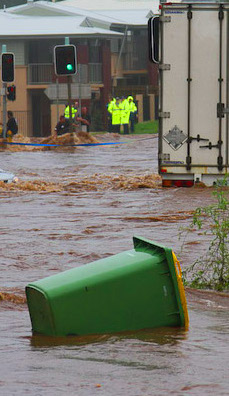Moves mooted in flood plan
 Lismore Council says protecting residents from floodwaters will be expensive, especially if they do not want to move.
Lismore Council says protecting residents from floodwaters will be expensive, especially if they do not want to move.
The NSW town of Lismore experienced its biggest flood in recorded history in February, leading to seven deaths, the displacement of thousands of people and damage to more than 1,800 homes.
Weeks later, flooding again inundated the region.
The Lismore Council has now released its draft housing and growth plans for community consultation, which brings together feedback from community meetings held earlier this year.
The feedback suggests there is community support for state government buybacks and relocation of flood-affected homes, but not everyone wants to go.
The council’s general manager says if people do not choose to move, some low-lying homes in the floodplain could be compulsorily acquired by the state government - at a potential cost of about $500 million.
“There are a lot of people we know who probably want to stay there, we would prefer they didn't,” general manager of Lismore City Council John Walker says.
“There will come a time in the future where it may be a compulsory acquirement, because you can't leave a handful of properties in harm's way.
“Potentially there are over a 1,000 houses that could well be affected and subject to house buyback schemes or relocation schemes, so it's a big planning decision, we think it's essential over time.
‘We are talking about properties that were affected significantly in this latest flood event.
“Effectively if you are in the floodplain and you want your house purchased, in a voluntary way, then you can put your hand up and there is a process for acquisition, valuation and timing.
“If you take 1,000 houses with an average cost of $500,000, that's $500 million; that's the sort of numbers you are talking about,” Mr Walker said.
The council says that since 2015, more than 3,000 housing lots in the Lismore local government area have been approved as sub-divisions, but they have not been commercially released.
“The reconstruction corporation has the power to compulsorily acquire and to develop, so we are hopeful that may stimulate more demand as well,” Mr Walker said.
Community meetings on the draft housing and growth strategies will be held in October at Caniaba, Clunes and Goonellabah.








 Print
Print